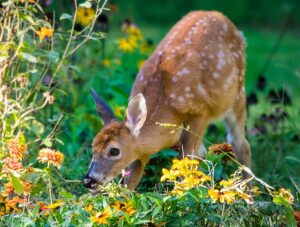 I’ll be the first one to admit it—gardening isn’t always fun.
I’ll be the first one to admit it—gardening isn’t always fun.
That’s probably shocking. You probably think that I live in a perfectly manicured yard, with leaves that magically disappear in the fall, flowers blooming from February through December, no ice storm damage and an invisible wall that runs a mile high and keeps all insects out.
Sorry. Not true. Hopefully, your bubble hasn’t burst too much.
I have weeds in my grass. Gasp! There are ant hills and yellow jacket nests, and just about every other year it seems a mole likes to visit my yard, creating wonderful little runs everywhere.
Now, there are nice things, and my ultimate goal is to make sure my yard looks better than my neighbors.
Perfect? Hah! There are unique features that make it a little different, sort of like those funky pillows you throw on a couch that are different from everyone else’s.
If you try for perfection, you’ll find it hard to succeed. You may have some success but you probably won’t have a life, spending hours weeding, watering, planting, mowing, mulching and composting instead of time with your friends and family.
The other extreme might not be practical either. It’s hard to make a junkyard look attractive and people still avoid them for a reason. Out in the country it’s easier than in the city, but you may find the postal carrier and UPS delivery person driving past. In the city, the health inspectors may come a-knockin’.
So you need an in-between, which is easier to achieve as you get older and realize that life holds more than perfection. It also could be the eyes failing and letting you believe things are better than they are.
There are ways to get around perfection. Language is one way.
First, say you’re doing “research.” People are always impressed and you can state that you are comparing any two or three things that pop in your mind. Put a couple flags out there of various colors to further create the “research” illusion. Just remember in the future to give them your “research” results so you complete the illusion.
And you can always say you’re repeating the same research because the results were “inconclusive.”
My catch phrase is “environmentally diverse” landscape.
First, no one can argue against the environment, unless you totally, totally, totally hate Al Gore, which means you don’t care really about anything and wouldn’t even consider visiting someone’s yard. Too green.
“Diversity?” It’s another current buzzword. Again, who can disagree with diversity? We know it makes for a more chemical-free landscape with predators such as bats, birds and good bugs keeping the bad critters in check. It’s also means concentrating on lots of different plants so you’re not looking at a solid green lawn with yellow dandelions.
If someone points out the dandelion, just say “It’s environmentally diverse, what’s wrong with that?”
I’ve felt lately if someone says I have a weed or two, they aren’t looking at all the things they should be concentrating on. And as long as people don’t point out the weeds, I’ve succeeded.
Then again, I do point out my neighbors’ weeds. Just remember your ultimate goal.
David Robson is Extension Specialist, Pesticide Safety for the University of Illinois. drobson@illinois.edu









